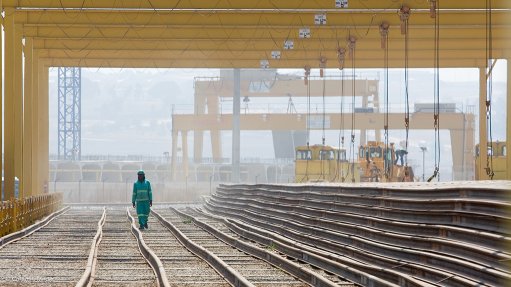
WALKING THE LINE
Although there have been less operational occurrences throughout the lockdown, safe railway behaviour promotion has been augmented for rail employees and the general public
Photo by: Creamer Media
The Railway Safety Regulator (RSR) expects that an analysis of railway safety incidents in April and May will reveal a declining trend in some categories of operational occurrence since some railway operations were suspended during levels 4 and 5 of the Covid-19 national lockdown.
As legislated, the RSR has continued to provide oversight for rail operations throughout the lockdown period through reports provided by all railway operators on operational occurrences, including derailments, collisions and people struck by trains, as well as security incidents such as theft and vandalism.
RSR media and communications executive Madelein Williams tells Engineering News that a concerning prevalence of high-impact incidents of theft and vandalism of infrastructure have been reported by railway operators during the lockdown period.
Although a statistical analysis of all data has not been concluded, she emphasises that levels of safety are assessed in relation to the intensity of railway operations, which has registered a significant decline, owing to most commuter rail services being suspended or limited for the past two months.
Williams explains that overcrowding on passenger trains and platforms is an ongoing concern that existed before Covid-19 physical distancing requirements highlighted it even more. She says overcrowding is particularly prevalent on trains and platforms operated by the Passenger Rail Agency of South Africa (PRASA).
“This is owed to the system’s inadequate capacity to meet service demand. The system is also vulnerable to theft, vandalism and train torching, which exacerbate capacity challenges,” she says.
To this end, PRASA has committed to a costed engineering and maintenance plan. Moreover, the implementation of this plan is one of the conditions attached to PRASA’s operating safety permit issued by the RSR, which Williams says will be closely monitored.
Meanwhile, the RSR also continues to monitor PRASA’s corridor modernisation programme.
Covid-19 Response
Williams says the Covid-19 outbreak and the consequent lockdown have compelled the RSR to reimage its approach to education and awareness campaigns.
The RSR’s conventional safety campaigns before the lockdown entailed human interactions at railway stations and hotspot areas such as level crossings and settlements adjacent to the rail reserve.
However, since the outbreak, the RSR has resolved to employ digital platforms – such as social media and community-based media, including community radio and online publications, to address rail safety.
“It is, however, worth noting that the RSR’s education and awareness campaigns are informed mainly by the RSR’s yearly ‘State of Safety Report’, emerging trends and consultations with rail stakeholders,” Williams explains.
Based on these inputs, the RSR’s digital education and awareness campaigns during lockdown have been focusing on issues such as people getting struck by trains, level crossing safety and security-related occurrences such as cable theft.
“The education and awareness campaigns may also include any issues that may emanate from our engagements with rail stakeholders during the lockdown period,” she says.
Williams adds that the campaigns at level crossings strive to educate motorists and members of the public on safe railway behaviour when interacting with level crossings. Safety tips and messages are provided in the form of electronic pamphlets and are posted on social media.
“The same approach is intended for rail employees and will be augmented with posters that are going to be posted at the operators’ depots and offices.”
The RSR also has a call centre to which members of the public can report unsafe rail conditions.
Meanwhile, the Preventative Measures in the Railway Operations (Covid-19 Control Measures on the Operations by Rail) Directions bylaws were promulgated by the Department of Transport on March 25, following consultation with the RSR in drafting the provisions contained therein.
Amendments to these bylaws were subsequently gazetted on May 4 and are applicable to all rail operators issued with an operating safety permit by the RSR in terms of the RSR Act.
The directions require all railway operators to develop Covid-19 management plans and to submit these to the RSR. Operators should provide Covid-19 health awareness information to affected parties within their operations while providing access to hygiene and screening equipment, as well as disinfection controls within their operational areas.
Railway operators are also prohibited from allowing the overcrowding and overloading of trains, and have to report suspected and confirmed cases of Covid-19 to the RSR and the National Institute of Communicable Diseases.
Williams assures that the RSR has communicated these requirements to all safety permit holders and has been receiving the requisite Covid-19 management plans, along with reports on suspected and confirmed Covid-19 infections.
She says the RSR has also developed a self-assessment guide for operators to assess their compliance with all provisions contained in the directions.
“The RSR monitors compliance through these self-assessment reports. On-site verifications were conducted on Gautrain operations, while further limited on-site verifications were conducted throughout the lockdown Level 4 period.”
The provisions of the directive will continue to be monitored and verified through ongoing inspections.
While PRASA’s commuter service operations have been suspended under levels 4 and 5 of the lockdown, the agency is developing a post-lockdown management plan, which will be submitted to the RSR for a compliance and adequacy assessment.